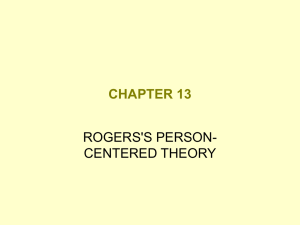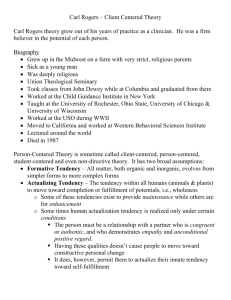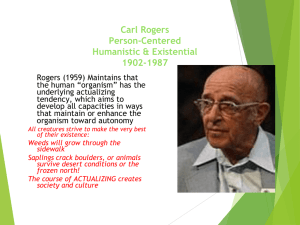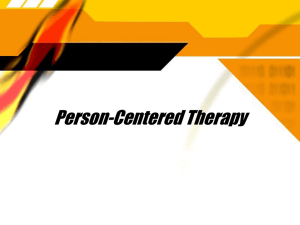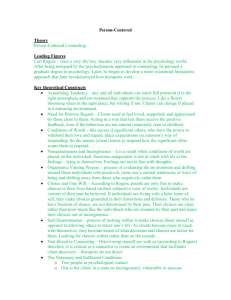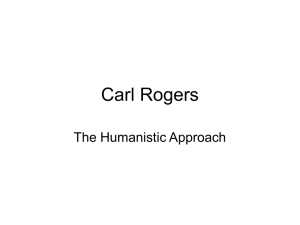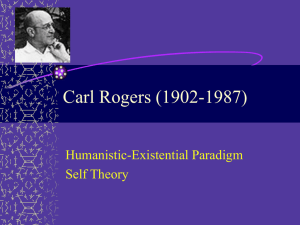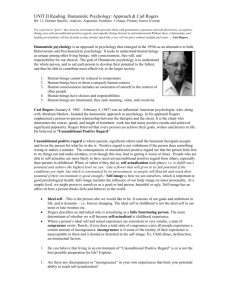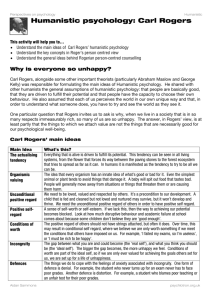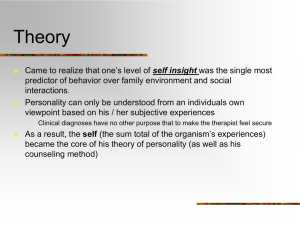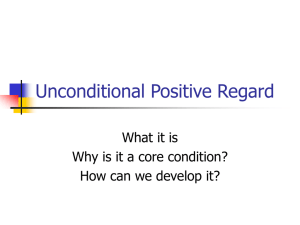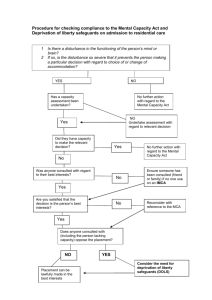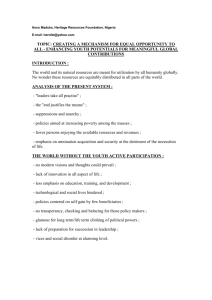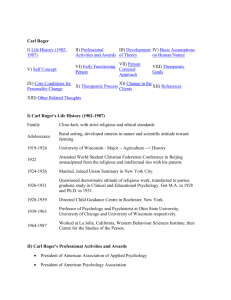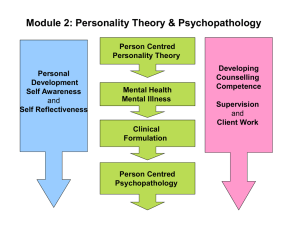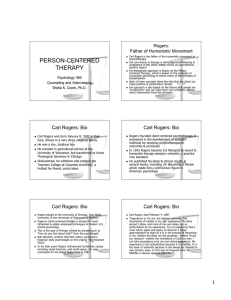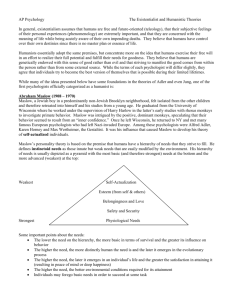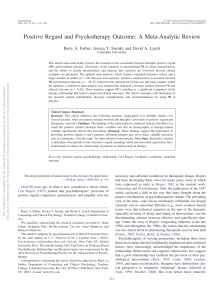Carl Rogers
advertisement
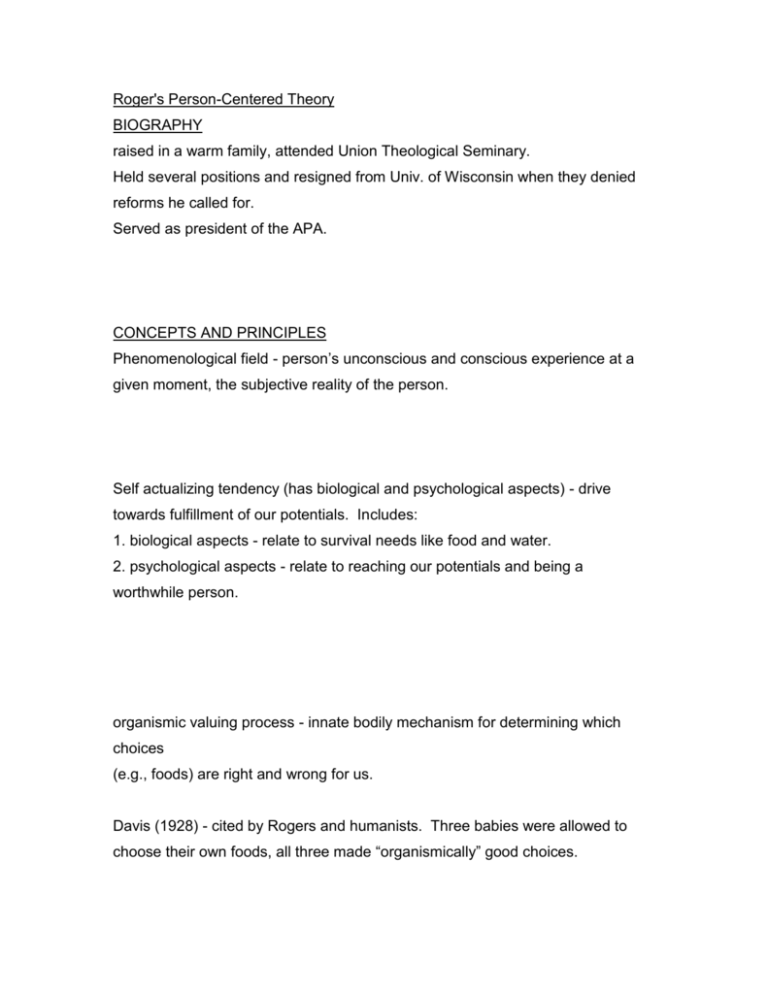
Roger's Person-Centered Theory BIOGRAPHY raised in a warm family, attended Union Theological Seminary. Held several positions and resigned from Univ. of Wisconsin when they denied reforms he called for. Served as president of the APA. CONCEPTS AND PRINCIPLES Phenomenological field - person’s unconscious and conscious experience at a given moment, the subjective reality of the person. Self actualizing tendency (has biological and psychological aspects) - drive towards fulfillment of our potentials. Includes: 1. biological aspects - relate to survival needs like food and water. 2. psychological aspects - relate to reaching our potentials and being a worthwhile person. organismic valuing process - innate bodily mechanism for determining which choices (e.g., foods) are right and wrong for us. Davis (1928) - cited by Rogers and humanists. Three babies were allowed to choose their own foods, all three made “organismically” good choices. Criticisms of Davis: 1. gestures may have been misinterpreted by nurses. 2. sample of only three babies was too small. 3. none of the foods were really lacking in nutritional value. The “animal literature” does not support the organismic valuing process. Fully functioning persons - utilize their potentials to the maximum degree. They are open to new experiences. They live “in the present” trust their instincts, are creative and live rich lives, and trust their own experience. Emerging persons - have given up the “rat race” and are moving towards becoming fully functioning. They trust their own experience and have a profound distrust of all external authority. social self vs. true self social self - self a concept of ourselves based largely on the approval of others. true self - self concept based on our own feelings and experiences. need for positive regard - we (most of us) need the support and approval of others. conditions of worth - ways of behaving that are required for acceptance by others. Conditional positive regard - acceptance based on “conditions of worth.” Unconditional positive regard - acceptance of the person free of any requirements or “conditions of worth,” (You can get lots of this from your dog or, if you’re lucky, from your therapist). Lack of “congruence” - exists if there is a discrepancy between the person’s behaviors (social self) and the person’s self concept, thoughts, and feelings (true self). “subceived” threat - a feeling of anxiety, a sense that something is wrong without knowing exactly what it is (we may be feeling incongruence). ASSESSMENT TECHNIQUES The Q Sort technique - used by Rogers to assess change with therapy. Clients sort about 100 adjective cards twice before and twice after therapy. Client rates adjectives in terms of how descriptive the words are of their “current self” and of their “ideal self.” The two sets of scores should correlate more highly after than before therapy. THEORY'S IMPLICATIONS FOR THEREAPY “Person Centered Therapy” the therapist provides a genuine and accepting relationship which the client can use for personal growth. Therapy is “Nondirective”- in contrast to cognitive or behavioral therapists, therapy is a joint effort. The “CLIENT” is an equal, the client MUST receive “unconditional positive regard.” Mrs. Oak - a famous cases study using a variation of the Q sort technique. Declining correlations (with baseline) over the course of therapy showed that she became more "unlike" the person she described at baseline. The change was, however, "small." Researchers such as Eysenck have questioned the validity of the therapy research done by humanists. Roger’s views on education - reform is needed, it should be less coercive and authoritarian. He believed: students CAN be trusted to pursue their own goals, passive learners do Not grow into creative people. Constant quizzes and examinations detract from the educational process. Roger’s views on marriage - in its present form, it is a failing institution. It should be for each person enhancing the other, NOT rigid commitment. Satellite relationships - relationships outside of marriage that may or may not include sexual intimacy are OK with Rogers. Evaluation: Applied value - is strong in the areas of education, counseling, family relationships, leadership, etc. Has had more impact on "counseling" than on "psychology."
